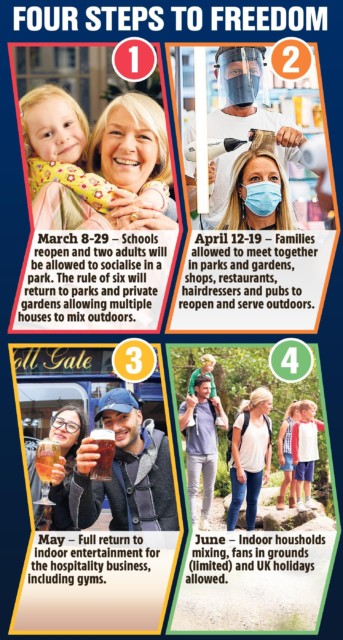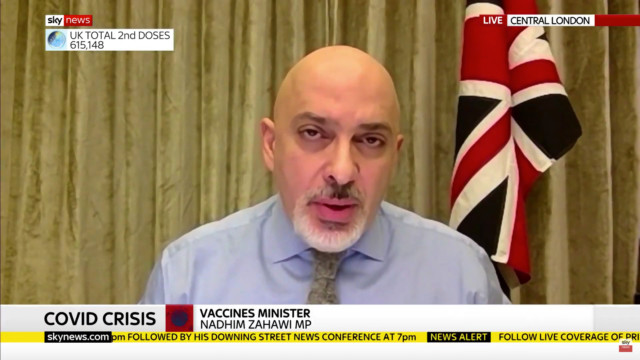LOCKDOWN will begin to ease on March 8 when children return to school and people are allowed to meet up outdoors again, the Government confirmed today.
Vaccines minister Nadhim Zahawi said the UK’s vaccinations programme is “beginning to really bear fruit” meaning restrictions can be loosened.
This afternoon the PM will detail his roadmap for rolling back the curbs on every day life during a speech to Parliament.
He will lay out a “steady as she goes” approach with four tests that must be met before every new phase of the unlocking can go ahead.
The plan will be based on an “outdoors versus indoors” priority because transmission of the virus is much lower outside.
Mr Zahawi confirmed that the first step will be for all children in England to return to the classroom on March 8.
On the same date two people from different households will also be allowed to meet up outside for the first time in months.
Friends and family will be allowed to go for a walk or “sit on a park bench for a coffee or a sandwich” under the new rules.
Mr Zahawi said they have been drawn up “to address some of the issues around loneliness and mental health” caused by lockdown.
Then from March 29 the stay at home message will be scrapped and two households of any size will be allowed to meet outdoors.
The rule of six rule will also return for outside mixing, allowing people to gather with their friends in groups.
And Brits will be free to play outdoor sports again, such as golf and tennis.
Under the new rules people will be able to travel across the country to meet up with friends and relatives outdoors.

But the vaccines minister didn’t say whether the new regime would allow people to host gatherings in their gardens.
And those desperate for a haircut have to wait at least seven weeks for salons to reopen.
It will be Mid-April before they are unlocked along with non-essential shops, while restaurants and pubs will be able to serve customers outdoors.
The rest of restrictions will be eased in May and June with inside mixing and drinking — with the hope of normality by July, when every adult will have been offered a Covid jab first dose.
Mr Zahawi said the measures can start to be lifted because of promising evidence about the effect of the vaccines programme.
Public Health England has been carrying out two mass studies, on health workers and care home residents, who got the jab early.
The data they have returned about how the jab stops both serious illness and transmission have been used by the PM to draw up his roadmap.
Mr Zahawi said: “Suffice to say the evidence looks good.
“We wouldn’t be in this place this morning if we weren’t confident the vaccine programme is beginning to really bear fruit.”
But the vaccines minister warned No 10 could yet slam the brakes on the unlocking if the virus starts to spread again.
He revealed the four tests the PM will use to decide on whether or not to go ahead with different phases of reopening.
The first will be ensuring the “vaccine programme continues at pace” with over 50s set to be jabbed by mid-Aril, and all adults by mid-July.
Next ministers will keep an eye to make sure the vaccines are working “and we’re seeing a reduction in infections, hospitalisations, and deaths”.
Third will be to ensure infection rates aren’t rising due to the reopening “to a level which would overwhelm the NHS”.
And finally mass genome sequencing will be deployed to make sure any new variants are kept under control and don’t become the new dominant strain.
Mr Zahawi said: “The focus is very much on steady as she goes, outdoor versus indoor priority. The important thing is to make it sustainable.
“The PM has tasked us not only to deliver the largest vaccination programme in the history of the NHS, but also to look at variant vaccines that may be needed as an Autumn booster, and a longer term future proofing of the vaccination programme.
“I’m confident if we do this cautiously, and we do it based on the data, the evidence, then it will be sustainable and it should be last time we ever enter this severe level of lockdown because of Covid 19.”








